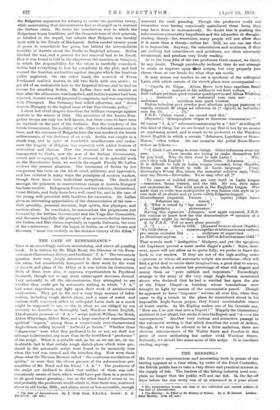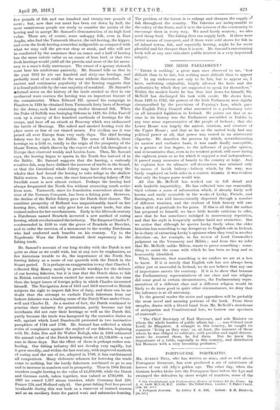THE HERRING.t
Ma. SAMUEL'S unpretentious and interesting book in praise of the herring appears at a time when., by order of the Food Controller, the British public has to take a very direct and practical interest in the supply of fish. The leaders of the fishing industry need com- plain no longer that the public will not eat fish. In the far-off days before the war every one of us consumed in a year about * The interpolation la ours, not that of the cultivated stud earnest authors of Tie Gate of Remembrance.
$ The Herring : its Effed on the History of Britain. By A. If. Samuel. London John Murray. (10s. Od. aeLl
five pounds of fish and one hundred and twenty-two pounds of meat ; but, now that our meat has been cut down by half, the most carnivorous people are ready to consider the merits of the herring and to accept Mr. Samuel's demonstration of its high food value. There are, of course, some unhappy folk, even in East Anglia, who find the Yarmouth bloater, the red-herring, the kipper, and even the fresh herring somewhat indigestible as compared with what we may call the pre-war chop or steak, and who will not be comforted by the assurance that an ounce and a half of herring has the same caloric value as an ounce of lean beef, or that two fresh herrings would yield all the protein and most of the fat neces- sary to a man's daily sustenance. The owner of a queasy stomach must bear his misfortune patiently. Mr. Samuel tells us that in the year 1913 he ate one hundred and sixty-one herrings, and Probably most of us could do the same without discomfort. The ancient and continuous popularity of the herring suggests that it is found palatable by the vast majority of mankind. Mr. Samuel's is formal notes on the history of the trade remind us that in our mediaeval wars oversew the herring was an important feature of the commissariat. When Edward III. opened his campaign in Flanders in 1338 he obtained from Yarmouth forty lasts of herrings for the Army, each last containing twelve thousand fish. When the Duke of Suffolk was besieging Orleans in 1429, Sir John Parnell took up a convoy of five hundred eartloads of herrings for the troops, and beat off an attack at Rouvray which was nicknamed the battle of Herrings. The salted and smoked herring took the plwee more or less of our tinned meats. For civilian use it was prized all over Europe from very early days. The chief herring fishery was for ages in the Baltic. The arms of Lubeck, three herrings on a field or, testify to the origin of the prosperity of the Haase Towns, which throve by the export of salt fish throughout a Europe that observed weekly and Lenten fasts. Then, Mr. Samuel says, the herring began to spawn in the North Sea instead of in the Baltic. Mr. Samuel suggests that the herring, a curiously sensitive fish, may have disliked the increase of traffic in the Sound, or that the Greenland whale fishery may have driven away the whales that had forced the herring to take refuge in the shallow Baltic waters. In any ease, the once famous herring fishery off the Swedish coast is now almost extinct. Perhaps the herring had always frequented the North Sea without attracting much notice from man. Yarmouth, since its foundation somewhere about the time of the Norman Conquest, has been a fishing port. However, the decline of the Baltic fishery gave the Dutch their chance. The maritime prosperity of Holland was unquestionably based on her herring fleet, which not only gave her an export trade, but also trained sailors for her merchantmen. Early in the fifteenth century a Dutchman named Beuckels invented a new method of curing herring, which revolutionized the industry. The Emperor Charles V. condescended in 1550 to visit the grave of Beuckels at Biervliet, and to order the erection of a monument to the worthy Dutchman who had conferred such benefits on his country. Up to the Napoleonic Wars the Dutch retained their supremacy in the fishing trade.
Mr. Samuel's account of our long rivalry with the Dutch is not quite so clear as we could wish, but at any rate he emphasizes, as few historians trouble to do, the importance of the North Sea herring fishery as a cause of our quarrels with the Dutch in the Stuart period. It is perhaps an exaggeration to say that Charles L collected Ship Money mainly to provide warships for the defence of our herring fisheries, but it is true that the Dutch claim to fish in British territorial waters excited far more concern at the time than the larger issues of foreign policy in which Charles interested himself. The Navigation Acts of 1651 and 1650 reserved to British subjects the right to import fish free of duty, and there can be no doubt that the attempt to exclude Dutch fishermen from our inshore fisheries was a leading cause of the Dutch Wars under Crom- well and Charles U. As a matter of fact, the Dutch continued to practise their industry for generations, partly because our fish merchants did not cure their herrings so well as the Dutch did, partly because the trade was hampered by the excessive duties on salt, against which Lord Dundonald protested in two instructive pamphlets of 1784 and 1786. Mr. Samuel has collected a whole series of complaints against the neglect of our fisheries, beginning with Dr. John Dee and Sir Walter Ralegh, who in 1603 estimated the annual value of the Dutch herring trade at 0,759,000—a vast sum in those days. But the effect of these is perhaps rather mis- leading. Our fishing industry did not develop very rapidly, but it grew steadily, and within the last century, with improved methods of curing and the use of ice, adopted in 1780, it has outdistanced all competitors. Many elaborate schemes for fostering the trade came to nothing, but the hardy fishermen continued to go to sea and to increase in numbers and in prosperity. Thus in 1904 British trawlers caught herring to the value of £1,870,000, while the Dutch and German catch, taken together, was valued at £795,000. In 1907 we owned 1,317 steam trawlers, while Germany had 239, France 224, and Holland only 81. Our great fishing fleet has proved invaluable during this war both as a reservoir of trained seamen and as an auxiliary force for patrol work and submarine-hunting. The problem of the future is to enlarge and cheapen the supply o fish throughout the country. The fisheries are indispensable to the safety of the State, and it is to the interest of the community to encourage them in every way. We need hardy seamen ; we also need cheap food. The fishing fleet can supply both. If there were better means of transport, and if there were cold stores for fish in all inland towns, fish, and especially herring, might be far more plentiful and far cheaper than it is now. Mr. Samuel's entertaining book will at any rate stimulate public interest in a very important subject.



























 Previous page
Previous page